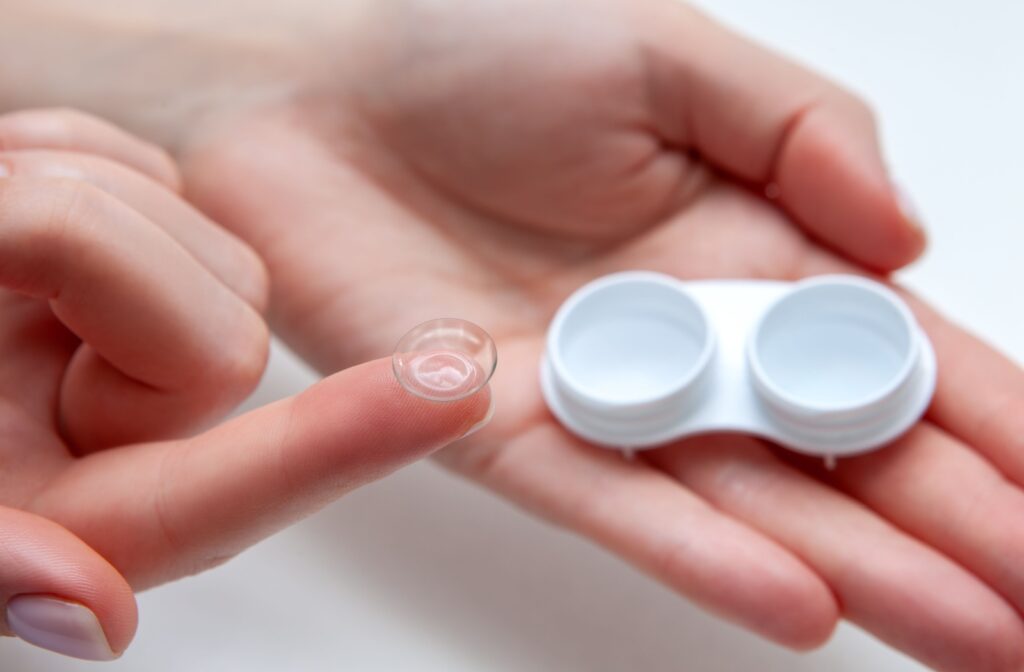Contact lenses are a popular choice for vision correction, offering convenience and comfort for millions of people. However, like any medical device, it’s essential that users understand their lifespan and how they can be affected over time.
Unlike food, where an expiration date relates to quality, the expiration date on contact lens packaging is not just a suggestion—it’s an essential indicator of the lens’s viability and safety. Therefore, it is crucial to follow the expiration date accurately.
River Heights Eye Care is here to help you determine the right contacts for your needs–we encourage you to start with an eye exam.
Understanding Expiry Dates
Contact lenses typically have an expiry date printed on the packaging. The manufacturer determines this date based on various factors, including the materials used, manufacturing processes, and sterilization methods. It’s essential to adhere to this expiry date and only use lenses up to that date.
The expiry date is a guideline for the lens’s effectiveness and safety. Over time, contact lenses can degrade, leading to changes in their physical properties, such as flexibility and oxygen permeability. Using expired lenses can increase the risk of eye infections, discomfort, and reduced vision clarity.
Factors Affecting Shelf Life
Several factors can affect the shelf life of contact lenses, even before their expiry date:
- Storage Conditions: Proper storage is critical for maintaining the quality of contact lenses. Lenses should be stored in their original packaging and kept clean, dry, and in well-ventilated areas, away from direct sunlight and moisture.
- Handling Practices: Mishandling of contact lenses, such as touching them with dirty hands or using saliva to moisten them, can introduce harmful bacteria and contaminants, shortening their shelf life and increasing the risk of eye infections.
- Frequency of Use: The frequency of lens wear can also impact shelf life. Daily disposable lenses are designed for single use and should not be worn overnight. Extended-wear lenses may have a longer lifespan but require proper care and maintenance.
- Cleaning and Disinfection: Following the recommended cleaning and disinfection routine for reusable lenses is essential for prolonging their shelf life and ensuring eye health. Failure to clean and disinfect lenses properly can lead to microbial buildup and lens deterioration.
Safety Considerations
Using expired or degraded contact lenses can pose significant risks to one’s eye health, often leading to conditions that require medical attention, including:
Eye Infections
When contact lenses expire, the sterility of the lens and the solution it’s stored in can be compromised. This breakdown creates an environment conducive to microbial growth. Bacteria, fungi, or protozoa can contaminate the lens, leading to severe eye infections.
Specific Infections
- Keratitis: Refers to an infection of the cornea. Symptoms can include redness, pain, excess tearing, and blurred vision. Severe cases of keratitis can lead to corneal scarring, which might necessitate a corneal transplant.
- Conjunctivitis (Pink Eye): Refers to inflammation of the conjunctiva—the thin, clear tissue over the white part of the eye. It can result in itchiness, redness, discharge, and a gritty feeling in the eye. Bacterial conjunctivitis can be caused by the use of contaminated lenses.
Corneal Abrasions
- Deterioration Impact: Over time, the smooth surface of contact lenses can become compromised due to material degradation, leading to the development of tiny cracks or tears on the surface of the lens, making it rough or abrasive.
- Consequences: When these roughened lenses are worn, they can scratch the cornea (corneal abrasion), leading to significant discomfort, sensitivity to light, redness, and a sensation of having something stuck in your eye. Corneal abrasions increase the risk of developing a secondary bacterial infection, adding further complications.
Reduced Vision Quality
- Material and Surface Changes: The quality of contact lenses can deteriorate over time due to changes in the lens material or the accumulation of microscopic deposits that cannot be removed through cleaning. These alterations can directly impact how light is focused by the lens, leading to compromised vision clarity.
- Symptoms and Impact: Individuals using expired or degraded lenses might experience blurred vision, increased sensitivity to light, burning or stinging, or even double vision. These visual disturbances not only reduce the quality of life but can also pose safety risks, especially while driving or operating machinery.

Preventive Measures
To avoid these serious risks, it’s essential to adhere to the expiration dates provided by contact lens manufacturers and replace lenses as recommended by an eye care professional. Proper lens care, including regular cleaning and storage in fresh solution, is also vital in maintaining the integrity and safety of contact lenses.
Regular eye exams are crucial for contact lens users. These exams enable early detection and treatment of any potential eye health issues and provide an opportunity for eye care professionals to review and reinforce proper lens care practices.
Safeguarding Your Vision & Eye Health
Contact lenses do have a shelf life, and it’s essential to adhere to the expiry date provided by the manufacturer. Factors such as storage conditions, handling practices, and cleaning routines play a significant role in determining the lifespan and safety of contact lenses.
By following proper care and maintenance guidelines, individuals can ensure the longevity of their lenses and protect their eye health.
Regular eye exams and consultation with an eye care professional are also crucial for monitoring eye health and ensuring the appropriate use of contact lenses. Remember, when in doubt, always err on the side of caution and replace your lenses as recommended.
Your eyes deserve nothing less than the best care possible, that’s why we encourage you to book an appointment with us at River Heights Eye Care.


